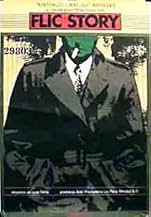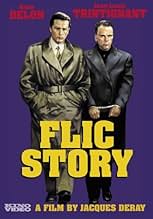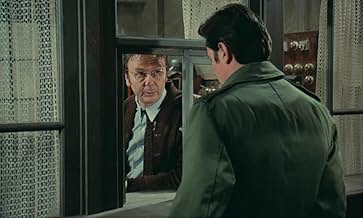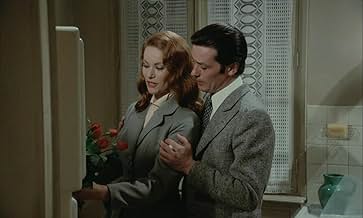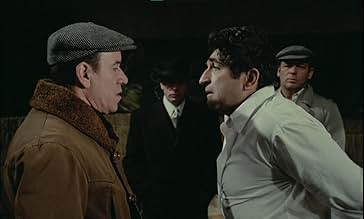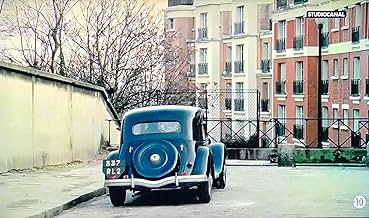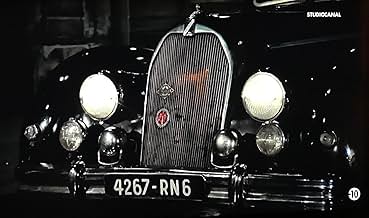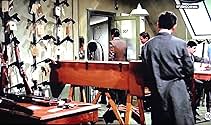Flic Story
- 1975
- 1 घं 52 मि
IMDb रेटिंग
6.9/10
3.3 हज़ार
आपकी रेटिंग
अपनी भाषा में प्लॉट जोड़ेंThe hunt for a seasoned killer becomes a matter of life for a policeman. Action-packed drama based on real events.The hunt for a seasoned killer becomes a matter of life for a policeman. Action-packed drama based on real events.The hunt for a seasoned killer becomes a matter of life for a policeman. Action-packed drama based on real events.
- निर्देशक
- लेखक
- स्टार
फ़ीचर्ड समीक्षाएं
'Flic Story' (1975) is one of the last films in a remarkable series of films 'noir' inspired by the world of French gangsters, made between the 1950s and the 1970s. The master of the genre was Jean-Pierre Melville, whose last film, 'Un flic' from 1972, cast Alain Delon as a crime fighting policeman. Rumor goes that when Jacques Deray undertook the making of this film inspired by a real case and true characters, after having managed to secure the participation of the two actors, he intended to give Delon the role of the gangster and Jean-Louis Trintignant that of the vigilante policeman. It would have been closer to the profiles of the previous roles played by the two, but it would have been a shame. The reversal of roles allows Trintignant to create one of the best performances of his career, and Delon is not bad at all either. The result was a film that Melville would surely have approved of.
Roger Borniche, whose memoirs inspired the film's script, had been a hero during World War II, who had enrolled in the police force because of a personal history. Idealistic, individualistic, unconventional in his choice of working methods, he often comes into conflict with his superiors and his entourage of bureaucratic colleagues, some of whom bear the burden of collaboration during the war. Having reached the position of inspector and with ambitions for advancement, he receives as a mission the capture of Emile Buisson, an escaped and extremely dangerous gangster who flees justice, robs and leaves corpses behind. The mission will not be simple and the pursuit will last many years.
The script is built as an alternation of scenes in which the policeman and the escaped criminal appear, the two meeting only at the end. The duel between Borniche and Buisson in the film translates into an artistic duel between the two great actors, among the most popular and appreciated of their generation. If a winner must be declared, he is Trintignant. They say that the roles of bad guys are easier to interpret. It may be true, but Trintignant's gaze of a killer (sometimes out of pleasure) can still freeze the blood in the veins of viewers. The criminal has one softer side: he loves Edith Piaf's music, and this will play a role in his capture, in an anthological scene. The entire cast is very well chosen and directed, the characters are credible, the milieu of crime and the police methods and stations of the 40s-50s are very authentically reconstructed. The only criticism I would make of the script is that it does not reflect the passage of time. The pursuit lasted for many years and became an obsession for the French media but also for the police, however the events unfold on screen in the almost two hours of cinema without marking the cinematic time. The screenwriters may have relied on the fact that this case was still present in the public memory of France in the 70s, but that is no longer true today. However, this is only a minor detail in an engaging and atmospheric film, which is worth watching or rewatching.
Roger Borniche, whose memoirs inspired the film's script, had been a hero during World War II, who had enrolled in the police force because of a personal history. Idealistic, individualistic, unconventional in his choice of working methods, he often comes into conflict with his superiors and his entourage of bureaucratic colleagues, some of whom bear the burden of collaboration during the war. Having reached the position of inspector and with ambitions for advancement, he receives as a mission the capture of Emile Buisson, an escaped and extremely dangerous gangster who flees justice, robs and leaves corpses behind. The mission will not be simple and the pursuit will last many years.
The script is built as an alternation of scenes in which the policeman and the escaped criminal appear, the two meeting only at the end. The duel between Borniche and Buisson in the film translates into an artistic duel between the two great actors, among the most popular and appreciated of their generation. If a winner must be declared, he is Trintignant. They say that the roles of bad guys are easier to interpret. It may be true, but Trintignant's gaze of a killer (sometimes out of pleasure) can still freeze the blood in the veins of viewers. The criminal has one softer side: he loves Edith Piaf's music, and this will play a role in his capture, in an anthological scene. The entire cast is very well chosen and directed, the characters are credible, the milieu of crime and the police methods and stations of the 40s-50s are very authentically reconstructed. The only criticism I would make of the script is that it does not reflect the passage of time. The pursuit lasted for many years and became an obsession for the French media but also for the police, however the events unfold on screen in the almost two hours of cinema without marking the cinematic time. The screenwriters may have relied on the fact that this case was still present in the public memory of France in the 70s, but that is no longer true today. However, this is only a minor detail in an engaging and atmospheric film, which is worth watching or rewatching.
As 'Roman-Policiers' go this is pretty good with its muted tones and sense of period and of Jacques Deray's output is the one that comes nearest to the style of Jean-Pierre Melville although one can never beat the original! It stars Alain Delon who made nine films with Deray and filmed the last of his three with Melville in 1972.
Roger Borniche who died last year at 101, utilised his experiences as a Police Inspector to inform his series of crime novels. This film deals with his most famous exploit in which he uses his resourcefulness and unorthodox methods to capture Emile Buisson, France's Public Enemy number 1 of 1950.
Delon is at the height of his popularity here and although far too attractive as Borniche he brings his customary 'edge' and aura of unpredictability to the role which I think is one of his best.
Everyone loves a villain so they say, not least actors(!) and the superlative Jean-Louis Trintignant relishes the role of psychopath Buisson. Being a thoroughly bad boy he naturally exerts a fascination over the female of the species and even Borniche's partner played by Claudine Auger, remarks on his lovely eyes!
As expected there are plenty of interesting 'types' here and mention must be made of Paul Crauchet who impresses as a petty criminal forced to turn informer.
An extra dimension is added here in the relationship that develops between Borniche and Buisson during the lengthy interrogations that take place after Buisson's arrest. It has been suggested that policemen have an inverted criminal mentality and here Borniche certainly adopts some highly questionable methods to get his man. These two characters could be said to represent both sides of the same coin. It is, according to Borniche, the childhood of Buisson that made his life of crime inevitable. The question as to whether it is Nature or Nurture or indeed a combination of both that makes us what we are is unlikely ever to be resolved.
Roger Borniche who died last year at 101, utilised his experiences as a Police Inspector to inform his series of crime novels. This film deals with his most famous exploit in which he uses his resourcefulness and unorthodox methods to capture Emile Buisson, France's Public Enemy number 1 of 1950.
Delon is at the height of his popularity here and although far too attractive as Borniche he brings his customary 'edge' and aura of unpredictability to the role which I think is one of his best.
Everyone loves a villain so they say, not least actors(!) and the superlative Jean-Louis Trintignant relishes the role of psychopath Buisson. Being a thoroughly bad boy he naturally exerts a fascination over the female of the species and even Borniche's partner played by Claudine Auger, remarks on his lovely eyes!
As expected there are plenty of interesting 'types' here and mention must be made of Paul Crauchet who impresses as a petty criminal forced to turn informer.
An extra dimension is added here in the relationship that develops between Borniche and Buisson during the lengthy interrogations that take place after Buisson's arrest. It has been suggested that policemen have an inverted criminal mentality and here Borniche certainly adopts some highly questionable methods to get his man. These two characters could be said to represent both sides of the same coin. It is, according to Borniche, the childhood of Buisson that made his life of crime inevitable. The question as to whether it is Nature or Nurture or indeed a combination of both that makes us what we are is unlikely ever to be resolved.
It so happened for me to watch it at the age of 54.
Had no clue whatsoever about this film.
In my book it is one proof too many that police / crime thrillers are no longer conceived in this fashion.
For the mere reason that film industry is going down the drain.
And it is a pity.
Do yourself a favour and watch it.
Regardless your generation.
Keep the flame of worthy film watching, lit.
Cheers.
Had no clue whatsoever about this film.
In my book it is one proof too many that police / crime thrillers are no longer conceived in this fashion.
For the mere reason that film industry is going down the drain.
And it is a pity.
Do yourself a favour and watch it.
Regardless your generation.
Keep the flame of worthy film watching, lit.
Cheers.
For those who didn't know the criminal history of France : Emile Buisson, born in 1902, started his robbers' life during the 30's, with his older brother. He get married, but his wife and their child died while he was in jail. And after this tragedy, Buisson became a killer. From jailhouses to asylums, Buisson finally escaped in 1947. For three years, almost 20 people were murdered, coldly, brutally shot by Emile. All victims of robberies, or thieves suspected for betraying Buisson. He was the first one in France to be called "P.E.n°1". It's these three years which are counted in "Flic Story". The young inspector Borniche had a lot of work to do in order to arrest Buisson. And he succeeded in 1950. And that wasn't the end. For four years, every crime was studied, dissected. In 1954, Buisson was condemned to die. Twice. On the dawn of February 28th, 1956, in the Santé Prison, M.Obrecht, the executioner, released the guillotine's chopper on Buisson's neck.
But if Borniche hadn't wrote his book, nobody would even remember about Buisson. The book is really good. So is the movie. Trintignant is probably too cute to play Buisson, but he gives a real performance : a real dead cold assassin. You have to like Delon, of course, even if he is great as Borniche ! (I think he is unbearable !) A good police movie !
But if Borniche hadn't wrote his book, nobody would even remember about Buisson. The book is really good. So is the movie. Trintignant is probably too cute to play Buisson, but he gives a real performance : a real dead cold assassin. You have to like Delon, of course, even if he is great as Borniche ! (I think he is unbearable !) A good police movie !
It's refreshing to watch a movie that gives the impression someone actually wrote a script about a story they wanted to tell and the story makes sense. It doesn't happen so often nowadays when most movies are self-indulgent; open-endedly boring or patronizing.
Delon and Trintignant, two of the biggest French stars of the 70s are respectively Borniche (the cop) and the killer-robber Buisson. The story is told in a linear way - thank you! - without special effects and only one car chase, short and realist enough.
Borniche is a top detective charged to find Buisson, a cold-hearted, pitiless criminal who escaped from prison. Loosely based on a real story - the chase lasted several years - Borniche is a sort of good cop, interested only in justice and reprimanding is "bad cop" colleagues, while there isn't much justification for Buisson violence. Therefore, the moral compass isn't too skewed.
I watched this in French and being my first Delon/Trintignant film, I was disappointed only by their ordinary, unsexy voices. Trintignant was especially chilly as the criminal, Delon convincing as the quiet cop, violence was few and far between and even more shocking because shown in all its meaningless brutality.
Delon and Trintignant, two of the biggest French stars of the 70s are respectively Borniche (the cop) and the killer-robber Buisson. The story is told in a linear way - thank you! - without special effects and only one car chase, short and realist enough.
Borniche is a top detective charged to find Buisson, a cold-hearted, pitiless criminal who escaped from prison. Loosely based on a real story - the chase lasted several years - Borniche is a sort of good cop, interested only in justice and reprimanding is "bad cop" colleagues, while there isn't much justification for Buisson violence. Therefore, the moral compass isn't too skewed.
I watched this in French and being my first Delon/Trintignant film, I was disappointed only by their ordinary, unsexy voices. Trintignant was especially chilly as the criminal, Delon convincing as the quiet cop, violence was few and far between and even more shocking because shown in all its meaningless brutality.
क्या आपको पता है
- ट्रिवियाBased on a true story.
- कनेक्शनFeatured in Jinek: एपिसोड #2.9 (2014)
टॉप पसंद
रेटिंग देने के लिए साइन-इन करें और वैयक्तिकृत सुझावों के लिए वॉचलिस्ट करें
- How long is Flic Story?Alexa द्वारा संचालित
विवरण
- रिलीज़ की तारीख़
- कंट्री ऑफ़ ओरिजिन
- भाषा
- इस रूप में भी जाना जाता है
- Cop Story
- फ़िल्माने की जगहें
- 8 Rue Désirée, Paris 20, पेरिस, फ़्रांस(Buisson hides out at Suzanne's apartment)
- उत्पादन कंपनियां
- IMDbPro पर और कंपनी क्रेडिट देखें
- चलने की अवधि1 घंटा 52 मिनट
- ध्वनि मिश्रण
- पक्ष अनुपात
- 1.66 : 1
इस पेज में योगदान दें
किसी बदलाव का सुझाव दें या अनुपलब्ध कॉन्टेंट जोड़ें


![Bande-annonce [OV]](https://m.media-amazon.com/images/M/MV5BNTg2NDc4MzgtZTFmZi00NTM2LWI4MmYtNjAzZGFiYzE5MmIyXkEyXkFqcGdeQXRyYW5zY29kZS13b3JrZmxvdw@@._V1_QL75_UX500_CR0)
